Millions educated at home as spring semester delayed
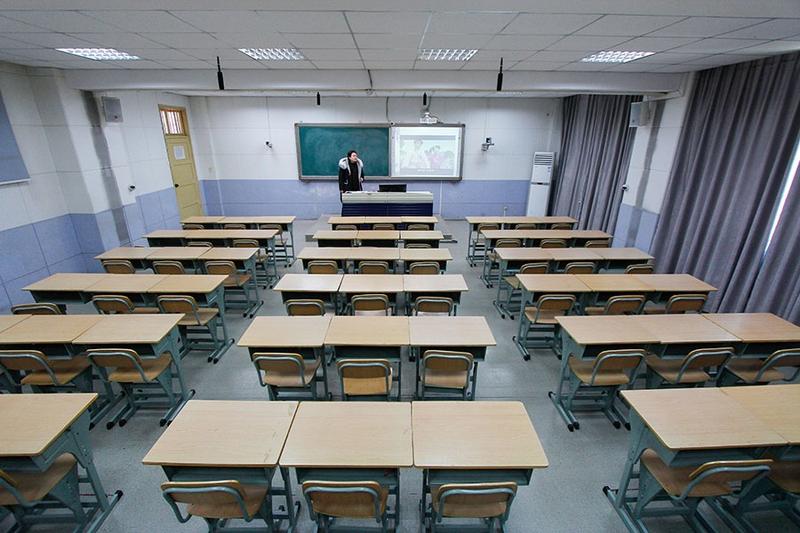 A teacher prepares an online course in a classroom at Longhui County No 1 Middle School, Shaoyang, Hunan province. (ZENG YONG / FOR CHINA DAILY)
A teacher prepares an online course in a classroom at Longhui County No 1 Middle School, Shaoyang, Hunan province. (ZENG YONG / FOR CHINA DAILY)
Rising before 7 am to see if every student in her class has registered their attendance online, Qin Mei starts her school day at home on her laptop and smartphone.
At 7:20 am, she has to call those who have not registered, to prepare them for their day's studies in cyberspace.
Forty minutes later, the 30-year-old math teacher begins livestreaming her lesson.
It was the first time I had tried a livestreaming app, and I felt quite nervou
Su Sishui, 50yearold high school teacher in Jinan, Shandong province
"It usually takes me four or five hours to prepare for the 40-minute class," Qin said, adding that she is still struggling with the new skills needed for online courses, such as speaking naturally in front of a camera and creating a PowerPoint presentation on analytical geometry.
In less than four months' time, her students at Zhongshan No 2 High School in Guangdong province are due to take the national college entrance examination. The gaokao, as it is called, determines which universities they can attend and could even have lifelong consequences for their employment prospects. "Every minute counts for the 12th-graders, who will take the most important exam in their lives," Qin said.
The ongoing novel coronavirus pneumonia outbreak poses a particular challenge for all 12th-graders nationwide, whose numbers are estimated to exceed 10 million this year.
While some major exams will be rescheduled due to the outbreak, Wang Hui, a Ministry of Education official, said at a recent news conference that the education authorities will carefully arrange work related to the gaokao, which is traditionally taken in June, to determine whether it should be postponed.
To help contain the epidemic, the ministry announced on Jan 27 that schools should delay the opening of the spring semester until further notice. It also called for "nonstop teaching and learning" and encouraged various online education methods.
Shortly after the announcement, Qin's classroom moved online, and she now works from 7 am to midnight.
"At around 11 pm, my colleagues and I usually conclude the livestreaming and discuss the courses for the next day," Qin said.
 An English-language course is recorded by a teacher in Yinchuan, Ningxia Hui autonomous region. (PHOTO / XINHUA)
An English-language course is recorded by a teacher in Yinchuan, Ningxia Hui autonomous region. (PHOTO / XINHUA)
In learning full-time from home, Qin's students have been just as busy as she has.
In the locked down epicenter of the outbreak in Hubei province, Wuhan No 11 High School and Wuhan Pacific High School are among those that have been exploring online education options.
Su Min, teaching supervisor at Wuhan No 11 High School, said: "Confronted by the epidemic, everyone has his or her own battlefield. Front-line medics are working at hospitals to save patients, but teachers of 12th-grade students are now working in online classrooms. When the war against the virus ends, the gaokao will have to be sat. It is our duty to help students fully prepare for the exam."
The school's online courses, launched on Jan 30 via Alibaba's DingTalk app, have been attended by more than 700 12th-grade students.
Yuan Kangyi, a 12th-grader from Wuhan who is staying with his father in Shanghai, has been following these courses every day and updating his mother, a nurse at Wuhan No 1 Hospital, on his progress.
"Studying hard is the best way to make my mom dedicated to her work," Yuan said.
For many students like him, studying online helps ease their anxieties.
Hu Zhengtian, a 12th-grader at Wuhan Pacific High School, said: "Seeing the surge in the number of people infected, I became anxious after being quarantined at home during the winter vacation. Having online classes relieves my tension and makes me focus on my studies. "The school's WeChat account shows that on Jan 30, teachers of 12th-grade students began conducting livestreaming courses via the QQ online messaging platform. Four days later, all 10th-and 11thgrade students at the school had started taking online courses.
When the new semester began online in Wuhan on Feb 10, more than 1 million primary and secondary school students and their parents viewed 426 virtual classes, according to the Wuhan education bureau.
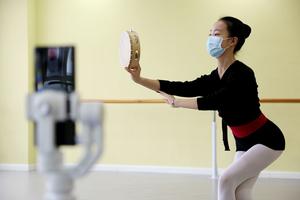 A dance teacher livestreams a lesson in Lianyungang, Jiangsu province. (WANG CHUN / FOR CHINA DAILY)
A dance teacher livestreams a lesson in Lianyungang, Jiangsu province. (WANG CHUN / FOR CHINA DAILY)
Government's efforts
Nationwide, traditional bricks-and-mortar schools are working with internet companies to offer classes online.
The Shanghai Municipal Education Commission announced that schools would launch a regional online education program via television and the internet. The program began airing on Monday.
Chen Baosheng, minister of education, said at a recent news conference on combating the outbreak, "We are coordinating and integrating State and regional teaching resources to guarantee online education for students nationwide."
On Feb 17, a cloud platform began broadcasting to ensure the country's 180 million students could continue their studies. In the first week, the platform offered 169 lessons covering 12 subjects.
The government has enlisted three major telecoms operators-China Mobile, China Unicom and China Telecom-as well as tech companies such as Huawei, Baidu and Alibaba to back up the platform with 7,000 servers, according to China Central Television.
In addition to online classes, primary and secondary school students can study via television, according to the ministry.
For students living in remote or rural areas with poor internet accessibility, a channel operated by China Education Television started airing classes on Feb 17 to enable home studies.
The Ministry of Education has issued an open letter to college students, suggesting that they learn from home.
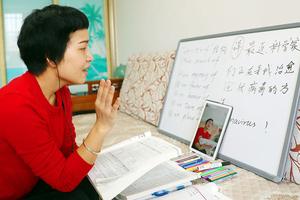 A teacher livestreams an English-language course from home in Jingjing county, Hebei province. (PHOTO / XINHUA)
A teacher livestreams an English-language course from home in Jingjing county, Hebei province. (PHOTO / XINHUA)
Some 22 online education platforms are offering more than 24,000 college courses for free, covering 12 undergraduate disciplines and 18 majors in technical and vocational education.
With most schools opening online classrooms, hashtags about the new phenomenon have been trending on Sina Weibo.
Su Sishui, a high school teacher in Jinan, Shandong province, became an online celebrity with his first livestreaming class when he accidentally turned on a beauty camera feature, showing him red-faced and wearing makeup. As a result, his wife intervened in the session several times.
"It was the first time I had tried a livestreaming app, and I felt quite nervous," the 50-year-old, who has taught math for 28 years, told the streaming app Pear Video.
Footage of a biology teacher in Jilin province using a glass door and a swab as teaching aids in his online class has also gone viral.
While some teachers are struggling with new education methods, students and parents have complained about the amount of time being spent onscreen and of low learning efficiency.
Sun Hui, a translator in Beijing whose daughter attends secondary school, said, "From morning to evening, she cannot leave her desk and keeps staring at the screen."
To reduce screen time, Sun bought an online printer to provide her daughter with study materials. Statistics from e-commerce platform Suning show that sales of printers have surged in recent weeks.
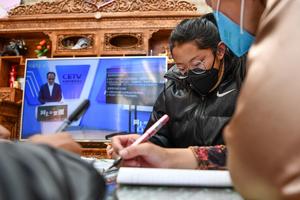 Geyang, a middle school student, takes a course aired by China Education Television at home in Lhasa, Tibet autonomous region. (PHOTO / XINHUA)
Geyang, a middle school student, takes a course aired by China Education Television at home in Lhasa, Tibet autonomous region. (PHOTO / XINHUA)
Amid criticism that online education has significantly increased the workload for students and teachers, the Ministry of Education said schools should not add an "unnecessary academic burden" to primary and secondary students through online classes.
Such courses should include infection prevention knowledge, psychological health and educational activities, rather than just subjects that place students under extra pressure, the ministry said.
No online classes should be provided to children at kindergartens, and parents of primary school students in lower-level grades can decide whether their children take such classes. For students in higher-level grades, schools should limit the amount of time spent on e-learning and the quantity of material, according to the ministry. It emphasized that protecting students' eyesight must be a priority through the introduction of measures to extend rest periods and encourage physical activity.
It also said schools should make good use of existing online teaching materials, rather than giving teachers an additional workload.
The education authority in Guangdong has issued a guideline for online classes, stating that such lessons should be limited to 20 minutes, with rest breaks and eye exercises included.
Lyu Yugang, head of the Ministry of Education's Department of Basic Education, said, "Online courses are only temporary measures taken during the epidemic, so when the new semester begins, schools should not replace classroom teaching with such classes."
 A primary school teacher livestreams a calligraphy course from home in Fuzhou, Fujian province. (PHOTO / XINHUA)
A primary school teacher livestreams a calligraphy course from home in Fuzhou, Fujian province. (PHOTO / XINHUA)
Free courses offered
With e-learning taking off nationwide, experts estimate that the viral outbreak will accelerate the convergence of the online and offline education sectors.
According to media reports, education companies such as Zuoyebang, Youdao and VIPkid are offering free online courses to expand their market presence.
Since Jan 25, the online education startup Zuoyebang has offered free classes on all major subjects from 8 am to 5:40 pm for primary and secondary school students nationwide.
Youdao, the education subsidiary of tech giant NetEase, is offering livestreaming classes for 470,000 students who have enrolled for the company's courses.
Li Fengqing, a professor in the Education Department at Shandong Normal University in Jinan, said, "The novel coronavirus outbreak has boosted awareness of and market prospects for online education."
In addition to education companies, video and social media platforms are playing a major role in the trend of studying at home.
On Feb 17, 50 million students and 600,000 teachers across the country used the livestreaming feature on DingTalk to hold online classes after the prolonged Spring Festival holiday.
Launched by video site Youku and DingTalk, the program has, since Feb 10, enabled primary and middle school students to attend free classes at home by logging in to apps.
The short-video platform Kuaishou is working with more than 40 online education platforms to provide free content to mitigate the impact of the delayed start to the spring semester.
However, there have been some glitches in the sudden switch to virtual classrooms and distance learning.
When most schools and colleges started their new semester online on Feb 17, many users complained of connectivity problems. By 8 am, more than 12 million users had overwhelmed the servers of the Chaoxing Learning app, which crashed. Service was fully restored in the afternoon.
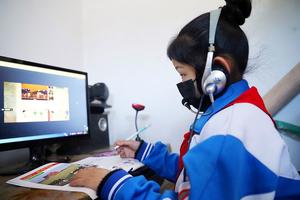 A primary school student takes an online class at home in Jingjing county. (PHOTO / XINHUA)
A primary school student takes an online class at home in Jingjing county. (PHOTO / XINHUA)
For some, online teaching has its drawbacks compared with traditional learning in a classroom.
Wu Jialu, a college teacher in Qinghuangdao, Hebei province, said: "For me, online classes deprive students of the benefits of being in a classroom, such as teacher-student interaction. Many students have complained that too much screen time is harming their health.
"But under such special circumstances, the internet helps make education more accessible," she added.
Despite such concerns, online education has made great strides in recent years.
According to a report by the Qianzhan Industry Research Institute, based in Shenzhen, Guangdong, the market size of China's online education sector exceeded 230 billion yuan (US$33 billion) in 2018, up from 70 billion yuan in 2012.
A report by iiMedia Research said that by this year, some 296 million people, equivalent to one-fifth of the nation's population, will be using such services.
The rapid development of technology such as artificial intelligence and virtual reality has enabled online education to become more manageable and accessible.
To keep up with this trend, many academic institutions, including Peking University and Tsinghua University, have livestreamed open classes via video platforms.
On Feb 3, Tsinghua University began livestreaming open classes on the video-sharing site Douyin, covering topics such as international relations, public speaking, traditional culture, interpersonal relationships and dance appreciation.
On Feb 5, an open class given by Yan Xuetong, director of the Institute of International Studies at Tsinghua University, attracted some 160,000 viewers. Yan used the emergence of the viral outbreak-and global reaction to it-to analyze the basic principles of international relations.
On Feb 13, Ke Jie, a leading player of the ancient board game Go, held an online class to pass on his skills as part of the open class program at Tsinghua University. "Faced with this outbreak, I hope I can contribute something meaningful, such as this lesson," Ke said.
At the end of the class, he gave a demonstration of Go chess, using the pieces to form the Chinese characters for "Stay strong, China".
Within three days, the course had received more than 12 million views.


